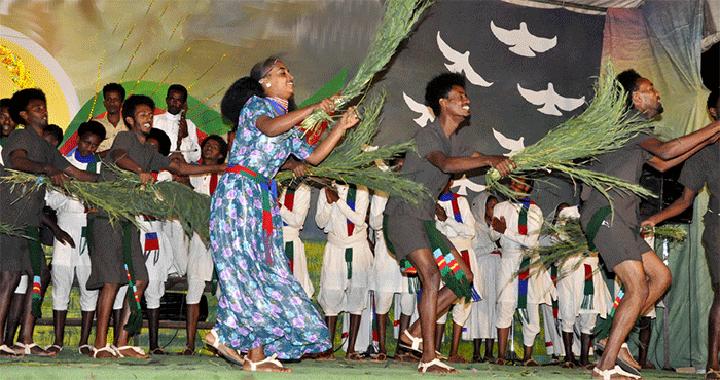Africa-Press – Eritrea. When I was a child I remember that whenever we had parties, whether it was a wedding or graduation, my grandmother and her friends gather up and start singing, dancing and clapping. Above all though, the lyrics and melody they come up with at the moment always turn out to be funny and the laughter would never stop. But these days, my mom and her friends never seem to be doing these kind of songs; whenever they gather for celebrations they rather let the stereo or the DJ do the work. Aside from some remixed or blended with modern music, original traditional songs are becoming very hard to get. Most people agree that the most we hear of traditional songs is during the annually held festival and during that limited period, it’s a known fact that all the types of traditional songs could not be performed.
According to Mr. Abraham Zere, journalist and researcher of oral traditions, traditional songs particularly in the Tigrinya ethnic group are a lot in number. Abraham was generous in giving time and sharing extracts from his research with us. Some of the type of traditional songs he mentioned are:
Wefera
(songs of work): These type of songs are sang on the daily activities of the society. Some of those daily activities include farm related works like plowing and harvesting. There is a tradition of helping widows and elderly people without children during the farm season, so within this time of work the workers sing songs as a motivation for the work they are doing to be accomplished smoothly. The songs they sing include Albiney Zuri and Hoho nea Hoho. Another important work done accompanied by the wefera songs is building and fixing Hdmos, local highland houses.
Wedding songs: These songs are generally happy songs, it is sang by women while preparing the feast for the wedding. Friends of the bride to be have a great role in this especially during Mekntat, a daylong singing and dancing celebrating the bride’s transition from a girl to woman. Moreover, there is mekbal and mefnaw where the friends sing to welcome the groom and his friends. Then when the ceremony ends the friends sing farewell songs which goes as Kidyom Kidyom adi guana kidyom feshke enda belki lebom teazebyom, it means go live with your in-laws just smile and see what’s in their heart. The male part in this celebration is on the wedding day. A group of men called Werado Meraa which encompasses the groom’s family members and friends heading to the bride’s house sing Shebo Lega Shebo also known as Megelele, which is a song of good wishes to the couple. And there are songs called Mehishe, which are sang on the honeymoon.
Hanse Meskele
and Ashenda Songs: These songs are sang particularly around Kudus Yohannes and Meskel holidays when the farm fields are green and flowers are blooming. This is the time when the farm season is done. Teenage boys and girls are allowed to mingle with each other and play around all day. Some of these songs are called Hembtit, Ashewtana, Hembeze and Shamno. These songs are very popular because the youngsters are free to express their feelings and give them more chance to be around each other. Another popular song is Hoye Hoye, where children and teenage boys circle around their village chanting songs that depict their good harvest season and wishing for a better year. When they are done circling the village, they start a bonfire inviting everybody to join them and celebrate with dances and songs all night.
Songs of Legends: Songs of this category are sang to represent the heroic figures in regards to their courage, ability and feats. Most of the men mentioned in these type of songs were great warriors. Some of these legends frequently mentioned in songs are Negusse Elfu, Yohanes Wedi Zemo, Ras Woldemichael Solomn and Bahta Hagos. Moreover, there are songs admiring the remarkable beauty of women such as Wuba, Mamet and Gual Seleba.
Songs of War: They are songs which are sang in times of war and after war. A memorable song is Sesenu Sesenu shehen wltan kunu ata eza adna keyatwa guana, loosely translated as lets be untied, brave and protect our country.
Songs of love: As its name indicates, these songs are dedicated to love. In the Tigrigna tradition it was not common to acknowledge your love openly especially if you are not married so it was much easier to sing out your feelings. Dekiski do dekas ayhabki lebi gobez abe zban sekelki, he is explaining how much her love hurts and that he couldn’t sleep because he thinks about her a lot.
Aror
and Graror: These are songs about motherhood particularly sang after three days of delivering the baby and in the first stages of the baby. Also they are lullaby. Ata e’ndu weday e’ndu weday melise do keetweka abza kebday, a mother affectionately singing to her baby.
Aidere
: Are songs that belittle the people who have done things out of the society’s norm. Some of these norms are infidelity, losing virginity and being pregnant out of wedlock, stealing and lying. These songs are specifically performed by girls from the age of 12-19. This out of all the songs is very crucial in keeping the society’s norms intact.
Mhlela
: These are practiced by older women and sometimes men. These chants are cry for help to God. Women gather around at one place and ask God for longer rainy season, health and peace for all. They also head to monasteries in group and stay there for a day or two singing to God the whole night.
The importance of traditional songs is very evident that the people who maintain such traditions are valued highly among the society, especially those who developed the ability to accompany the songs and chants with traditional music instruments. Some of the instruments used in the Tigrinya culture are drums, Kerar, Emblta and Wata. And some the notable people who used these instruments were Teklu Kerara, Elias Mesmer, Fekreslasie Okbaselasie and Teomzgie. Teklu was a conscripted Italian soldier and he was famous among his fellow soldiers for playing Kerar and making them feel like at home.
Wrapping up his chat on the types of Tigrinya traditional songs, Abraham said our traditional songs are barely surviving, they are being blended with modern beats that they are losing their originality even in the far remote villages. He calls out for the youngsters to go back to their roots and make the traditional songs lively again.
For More News And Analysis About Eritrea Follow Africa-Press







